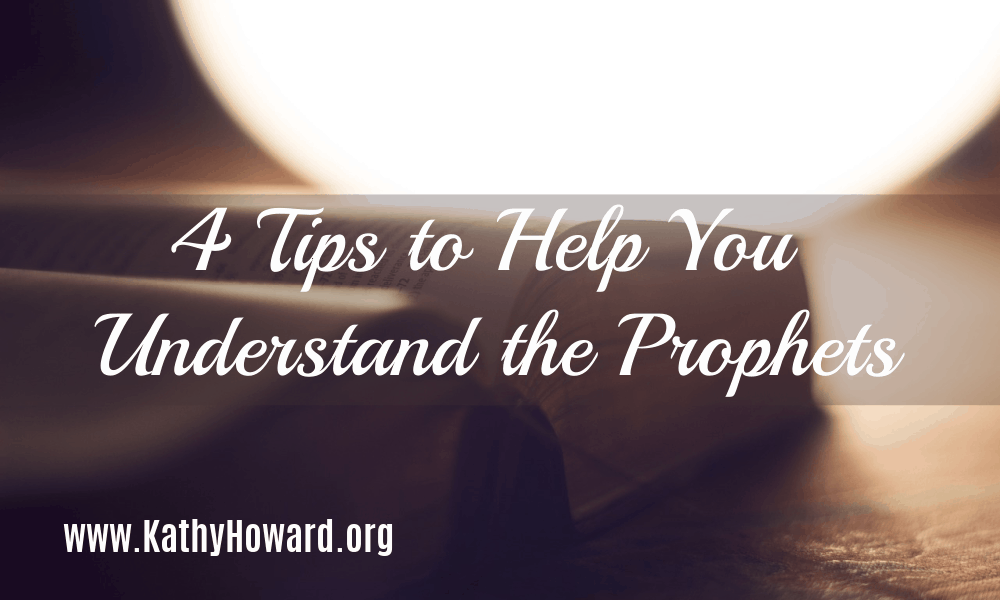I don’t know about you, but I tend to hesitate before jumping into reading or studying one of the prophets. In the past, I didn’t know how to correctly understand the prophets so I avoided them altogether. Now, I feel better equipped, but I also know I just can’t open up my Bible, read a short passage from one of the prophets and get an easy take-away. Of course, it’s not that easy with any Bible passage, but the nature of prophecy makes it a touch trickier. (Also see “6 Reasons to Read and Study the Old Testament.”)
For many of us, prophecy can be the most confusing type of literary genre. But the prophets are also filled with incredible spiritual truths we don’t want to miss. So, instead of shying away, let’s learn how to approach the prophets. (The Bible contains different forms of literary genres. For more on this see “Quick Tips for Handling 8 Different Biblical Genres.”)
What is “prophecy?”
“Prophecy” is God’s word given through His messenger to people – usually His own people, but sometimes others. The important thing to remember is that prophecy is a specific message from God through a human messenger to a specific people at a specific time. The Old Testament includes 4 major and 12 minor prophets. The “major” and “minor” designations are strictly based on the length of the book, not the value of the prophecy. Basically, there are two kinds of prophecy:
- “Foretelling” – Refers to a prophet’s predictions about the future. According to the book Introduction to Biblical Interpretation, only 5% of biblical prophecy refers to events in the New Covenant age. And less than 1% refers to events still to come. In other words, 99% of all prophecy in the Bible has already been fulfilled.
- “Forthtelling” – Indicates messages for the prophet’s own audience about their time or the near future. The prophets were God’s covenant enforcers. Most often, the prophets boldly revealed the ungodliness and idolatry around them. They warned of God’s pending judgment and urged the people to repent before it was too late.
A Few Tips to Help You Understand the Prophets
The following tips are just the tip of the iceberg. We could talk about each tip in great length. But, these tips will give you a good head start as you read the prophets.
- Keep the context in mind – As we saw above, prophecy was given by God to a specific people at a specific point in history. If we pull the prophecy out of this context there is a good chance we will misunderstand it. Not all prophecy in the Bible has direct application to us today. However, we can apply the underlying spiritual truths of prophecy to our own lives. For more on context see “4 Things to Consider for Biblical Context.”
- Don’t get bogged down in symbolism – Symbolic language, word pictures, and poetry fill prophecy. Focusing on the symbolism can cause us to miss the big picture. Look for the major points and overall spiritual truths instead.
- Be aware of multiple levels of fulfillment – Prophecy often – if not usually – will be “fulfilled” more than once. First, near the prophet’s lifetime and again long after his life. Many of these “2nd fulfillments” are Messianic in nature. The first fulfillment in near history and the second finding its greater fulfillment in Jesus.
- Look for the “conditions” – Many prophecies are “if/then.” For instance, many of the prophets warned of God’s judgment and called people to repentance. If the people didn’t repent, God would bring His judgment. If they did repent, God would be merciful. The book of Jonah is a good example of this.
Note: Apocalyptic prophecy – primarily Daniel and Revelation – presents even more challenges and is beyond the scope of this post.
Don’t be afraid to read and study the prophets! They have value for our lives today. The underlying truths and eternal spiritual principles have solid application for our lives today. Not long God used the prophet Haggai to point out something very specific in my life. (See “Surprised by an Old Testament Prophet.”) You just may be surprised by what God teaches you through the prophets!
Who’s your favorite Old Testament prophet? Why?



Very helpful. Thanks.
Elajah